JAWSphinx
John Anthony West (1932-2018): Emmy-award winning writer, science-fiction author, Gurdjieff practitioner, rogue Egyptologist, and raconteur
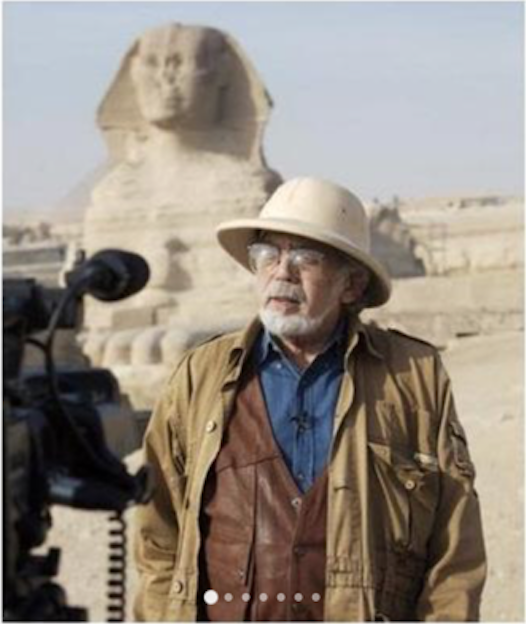 Paying homage here to a giant in the field of Egyptology, esoterica, and satire, a brilliant man who had a strong influence on me over the years. John Anthony West, or JAW as he signed himself (and JAWSphinx as his email address went)—died on February 6, 2018, at age 85. So-called ‘real-life Indiana Jones’ figures are somewhat common, but West had as much right to the title as anyone, although he was rather more cerebral than Harrison Ford’s goofy, swashbuckling character. He was many things: a satirist, a science-fiction, travel-guide, and ancient civilizations author, a playwright, a witty public speaker, a practitioner of the inner work, and most importantly, a cutting-edge Egyptologist, a fierce rebel standing in opposition to mainstream Egyptology, and a voice for a whole subculture of seekers drawn to the mysteries of Egypt but wanting more than traditional academic (or ‘quackademic’, as one of West’s neologisms had it) views. His twice annual guided tours to the sacred sites in Egypt were legendary. What made West stand out were two things: he was brilliant (and brilliantly funny—he wrote satire in his earlier career), and he was more than just an intellectual, he was also a teacher of the mysteries and had spent time in the Gurdjieff Work in his earlier years. He was a legitimate master of his craft and a wise elder.
Paying homage here to a giant in the field of Egyptology, esoterica, and satire, a brilliant man who had a strong influence on me over the years. John Anthony West, or JAW as he signed himself (and JAWSphinx as his email address went)—died on February 6, 2018, at age 85. So-called ‘real-life Indiana Jones’ figures are somewhat common, but West had as much right to the title as anyone, although he was rather more cerebral than Harrison Ford’s goofy, swashbuckling character. He was many things: a satirist, a science-fiction, travel-guide, and ancient civilizations author, a playwright, a witty public speaker, a practitioner of the inner work, and most importantly, a cutting-edge Egyptologist, a fierce rebel standing in opposition to mainstream Egyptology, and a voice for a whole subculture of seekers drawn to the mysteries of Egypt but wanting more than traditional academic (or ‘quackademic’, as one of West’s neologisms had it) views. His twice annual guided tours to the sacred sites in Egypt were legendary. What made West stand out were two things: he was brilliant (and brilliantly funny—he wrote satire in his earlier career), and he was more than just an intellectual, he was also a teacher of the mysteries and had spent time in the Gurdjieff Work in his earlier years. He was a legitimate master of his craft and a wise elder.
Back in January of 2010 I’d emailed him in the hopes of his providing an endorsement for my book The Three Dangerous Magi: Osho, Gurdjieff, Crowley, a massive 714-page study of three radical and controversial 20th century gurus (Osho, G.I. Gurdjieff, and Aleister Crowley, published later that year by O-Books). At that time John was already 77 years old, but he responded quickly despite (as he put it) his insanely busy schedule. We struck up a friendly banter over several emails. His good will and brash New Yorker honesty were evident off the bat. He implied that his ‘Hemingway bullshit-detector’ was strong, so he didn’t have to read much of a book to know when it was worthwhile or not to earn his endorsement.
That sounds potentially like a very interesting study. But I am hopelessly, irretrievably busy with my own work and can promise nothing. If you send it to me, I will subject it to my standard protocol which I call ‘informed intuition.’
It's no more than a quick look, a couple of paragraphs, a skim through... but I make no apologies for it. More than 40 years involved in this work makes me fairly confident that this ‘informed intuition’ is valid. The pro ball player only has to watch a stranger swing the bat a few times to know if he at least has a sense of the game; the concert-class violinist only has to listen to someone play a scale or two to judge his or her grasp of the basics. So with me.
If your book passes my ‘I.I.’ test, AND I can think of something useful to say—not always the case even when the test is passed—I will.
Regards, John Anthony West (1)
In the older days this process would have involved me cramming a copy of my manuscript into an envelope (or more probably, a box in this case), shipping it off and waiting for weeks, or more likely months, for a letter back in the mail with (hopefully) some positive comments about one’s work. But this was 2010, and email technology showed its best colors. I sent the PDF of the manuscript to him with a click, and two days later he generously (and bluntly) responded.
Subjected to my ‘I.I.’ (informed intuition) test you pass with flying colors. I find myself wanting to read more. Even though I don't have the time, (and from what I read I don’t necessarily agree).
On the negative side, I detest Crowley! You say somewhere—or words to this effect—‘when you get past the bluster’. I say, quoting Buffon, ‘le style est l’homme meme’ and there is no ‘getting past the bluster’. The bluster IS Crowley.
Gurdjieff is a different matter, there’s the bombast of Beelzebub, but then the transcendentally canny faux-simplicity of Meetings, which, alas, the Gurdjieffians insist upon taking literally. That is to say, he could choose his ‘style’. That takes some doing.
There is no such subtlety with Crowley, he’s like a black magic computer program: WYSIWYG (what you see is what you get). Osho is another matter. But I don't know that much about him other than that people I respect a lot learned a lot from him. You can’t look like that and be a nobody: it communicates.
Anyway, you have written a very interesting book on three extraordinary people most people would not think to link up, you've certainly done your homework, you write well, which is a lot more than most people writing on such matters can say. (If that’s useful to you, use it.)
I hope I'll find time to get into the book at my leisure, if ever I have any. Send me a hard copy if you can when it’s out. I hate reading on a screen.
Best, jaw (2)
John’s career as an Egyptologist spanned 5 decades. He had not always been writing and teaching of such things. Though ‘rogue scholars’ of his sort often lack advanced academic credentials, he did in fact attend Lehigh University in Pennsylvania in the early 1950s where he studied economics. This was followed by a two-year stint in Europe with the army, and then a period in Manhattan working as a copywriter, leading up to the publishing of his first short story in 1958.
West was part of the ‘Beat Generation’, those young authors attempting to make sense of and give literary expression to the values (or lack thereof) of Western society in the period immediately following the Second World War. Examples of some such luminaries were Allan Ginsberg, whose Howl had appeared in 1956, and Jack Kerouac, author of the iconic On the Road, published in 1957, a work that remained required reading in college writing classes for decades to come. At that time many aspiring American ‘Beat’ writers sought the soils of Europe (mainly France or Ibiza, a small Spanish island) to ply their craft. West opted for the latter, proceeding to live on Ibiza from 1958 to 1966, during which time he wrote and published much of his fiction. (I’d spent some time on Majorca in 2006, a Mediterranean island just east of Ibiza, and can attest to its idyllic ambience, so perfect for writers, many of whom set up residence there including the famed Robert Graves).
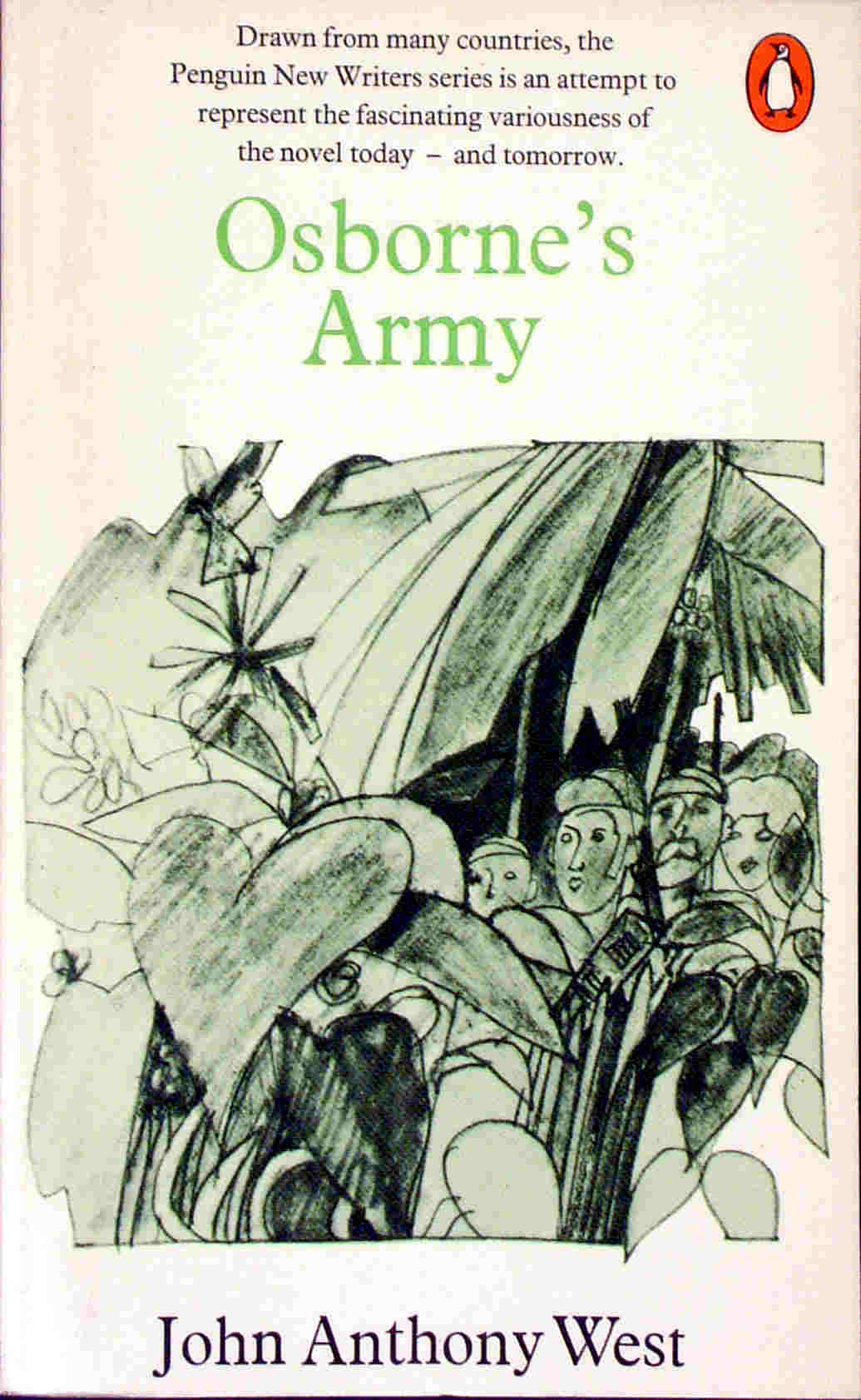 West’s published writing career went back 60 years, when as a young man of 26 he published his first story in 1958. He followed this up with the science-fiction short story The Fiesta at Managuay in 1961, and over the next two decades his sci-fi stories appeared in such recognized publications as The Magazine of Fantasy and Science Fiction and Omni magazine. In 1963 E.P. Dutton published his first book, Call Out the Malicia, a collection of ten short stories. This was followed in 1966 by a satirical novel, Osborne’s Army. His 1974 short story A Case History appeared in the Pocket Books anthology of sci-fi titled A Shocking Thing. The book, edited by no less a figure than Damon Knight, found West’s work alongside such giants in the field as Heinlein, Sturgeon, Bester, Aldiss, and even Ambrose Bierce (a possible influence on West), author of the renowned and deliciously satirical The Devil’s Dictionary. West was not unrecognized as a science-fiction writer; in 1962 he received a Hugo Award Memorable Mention.
West’s published writing career went back 60 years, when as a young man of 26 he published his first story in 1958. He followed this up with the science-fiction short story The Fiesta at Managuay in 1961, and over the next two decades his sci-fi stories appeared in such recognized publications as The Magazine of Fantasy and Science Fiction and Omni magazine. In 1963 E.P. Dutton published his first book, Call Out the Malicia, a collection of ten short stories. This was followed in 1966 by a satirical novel, Osborne’s Army. His 1974 short story A Case History appeared in the Pocket Books anthology of sci-fi titled A Shocking Thing. The book, edited by no less a figure than Damon Knight, found West’s work alongside such giants in the field as Heinlein, Sturgeon, Bester, Aldiss, and even Ambrose Bierce (a possible influence on West), author of the renowned and deliciously satirical The Devil’s Dictionary. West was not unrecognized as a science-fiction writer; in 1962 he received a Hugo Award Memorable Mention.
It was in Ibiza, in the early 1960s, that West first discovered the powerful and uncanny Greek-Armenian spiritual master G.I. Gurdjieff (1872-1949), via the writings of famed Gurdjieff-students such as Rodney Collin, P.D. Ouspensky, Maurice Nicoll, and the psychiatrist Kenneth Walker. When West left Ibiza in 1966 to travel to London, it was for the express reason of participating in a Gurdjieff community and receiving direct guidance in the master’s teachings, generally referred to as ‘the Work’.
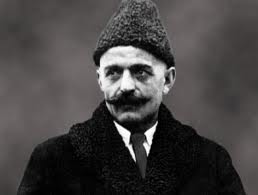 Gurdjieff had been an unusual teacher for many reasons; he trained under Sufi masters and had himself been part of a secret group called ‘The Seekers of Truth’ that had set themselves the task of uncovering the great esoteric wisdom teachings of the world. (Darker versions of such secret groups, real or allegorical, have always existed, such as Julius Evola's 'UR' group, seeking to draw on the occult teachings of ancient Egypt and Greece in order obtain magical powers in order to effect changes in the world on a mass level, but Gurdjieff's efforts were focused more on the awakening of the individual to their fullest inner potential). In Gurdjieff’s allegorical autobiography Meetings with Remarkable Men—published posthumously in 1963 and referred to by John above in his email comment to me about ‘Meetings’—he’d mentioned that he had spent time in Egypt working as a tour guide sometime in the 1890s in order to fund his esoteric research there.
Gurdjieff had been an unusual teacher for many reasons; he trained under Sufi masters and had himself been part of a secret group called ‘The Seekers of Truth’ that had set themselves the task of uncovering the great esoteric wisdom teachings of the world. (Darker versions of such secret groups, real or allegorical, have always existed, such as Julius Evola's 'UR' group, seeking to draw on the occult teachings of ancient Egypt and Greece in order obtain magical powers in order to effect changes in the world on a mass level, but Gurdjieff's efforts were focused more on the awakening of the individual to their fullest inner potential). In Gurdjieff’s allegorical autobiography Meetings with Remarkable Men—published posthumously in 1963 and referred to by John above in his email comment to me about ‘Meetings’—he’d mentioned that he had spent time in Egypt working as a tour guide sometime in the 1890s in order to fund his esoteric research there.
I had originally become aware of John Anthony West sometime in the late 1990s—a heady time to be alive in as a seeker of esoteric truths. I discovered him by hearing him on Art Bell’s famed late-night talk radio show (‘Coast to Coast AM’) dedicated to the paranormal, alternative theories of all stripes, and endless X-Files related matters. West was an uncommonly articulate guest but also refreshingly down to earth and obviously hugely knowledgeable about ancient Egypt. Bell was a master interviewer and largely sympathetic toward the esoteric. Dialogue between the two was a treat.
Ancient Egypt had long been an interest of mine, dating back to 1978 when I wrote an essay on the Giza pyramids for a college anthropology class. Twenty years later, in March of 1998, I followed this up by finally going to Egypt. I did not take one of John’s tours (or any other tour), as I was always a solo traveler. I’d decided in my earlier years, while on my first trip to India in 1985, that I would avoid groups when traveling to the lands of ancient civilizations as I wanted my own direct experience of things. There was a trade off there, to be sure. Most competent travel guides do provide useful or illuminating information that is unlikely to be found on one’s own, or even via a decent book. And this was certainly true with John’s tours.
Following a journey through Israel and Jordan, I spent a while in Egypt, roaming the Giza plateau, meditating inside the King’s Chamber of the Great Pyramid, studying the Sphinx, visiting Saqqara and the Red and Bent Pyramids, as well as the mysterious and creepy underground Serapeum, the grand temples of Luxor and Karnak, and the tombs in the Valley of the Kings and Queens. Cairo itself was insane, a giant experiment in controlled chaos, but the world-famous museum, home of the golden paraphernalia of King Tutankhamen and the famed statue of Anubis, was worth it alone. I’d ended my sojourn in the Sinai with a visit to St. Catherine’s monastery, the oldest Christian monastery on the planet.
One of the factors that had pulled me to Egypt was Gurdjieff and his famous claim—perhaps influenced by Theosophy and related movements from the late 19th century occult revival—that in his youthful wandering years he’d once found an old parchment map in the home of an elderly Armenian priest. The map supposedly was of ‘pre-sands Egypt’, and excited Gurdjieff because it showed the Sphinx on it, suggesting that the Sphinx was not actually the creation of the ancient Egyptians, but rather the legacy of a yet more ancient, possibly ‘pre-Flood’ civilization.
That, of course, was also a linchpin of John Anthony West’s teachings about ancient Egypt—and it was his aggressive promotion of this idea (aided by the flamboyant Boris Said, producer of the NBC documentary--see below) that was one of the things that got him in hot water with Egypt's powerful Minister of State for Antiquities, the notorious Zahi Hawass, not to mention an army of mainstream Egyptologists and historians. Based on something generally known as the ‘Sphinx water erosion hypothesis’, this was an idea originally put forth by West’s mentor-in-spirit Schwaller de Lubicz in the 1950s, that the Sphinx bears distinct signs of water-erosion, signs that could only have been created during the Egypt of more than 5,000 years ago, which then and only then had rainfall sufficient to create such erosion. The implications were obvious. If the Sphinx was that old, then the ancient Egyptians could not have built it. It was, therefore, a legacy of an older civilization (possibly Plato's 'Atlantis', although that name unfortunately came to be tarnished by decades of new age nonsense). West took this radical idea and ran with it, basing much of his Serpent in the Sky on it and other symbolist ideas. In 1989, realizing that he needed some credentialed clout to lend legitimacy to this idea, West recruited a Boston University geologist, Dr. Robert Schoch, to examine the Sphinx. When Schoch endorsed the water-erosion theory the matter was more easily made accessible to the mainstream public. It also set off an ongoing academic war between geologists (many of whom endorsed Schoch and West) and Egyptologists, who scorned the idea and insisted that the Sphinx was built by a pharaoh (probably Khafra) around 2,500 BC. To be fair, the arguments for the Sphinx being of that more traditional age are persuasive in some ways, especially for one who lacks any understanding of geology. However, reading Schoch's detailed geological analysis of the situation, which can be seen in the multiple appendices of his recent book co-authored with Robert Bauval, Origins of the Sphinx, (Inner Traditions, 2017) makes it a stretch to continue to regard the 2,500 BCE date without skepticism.
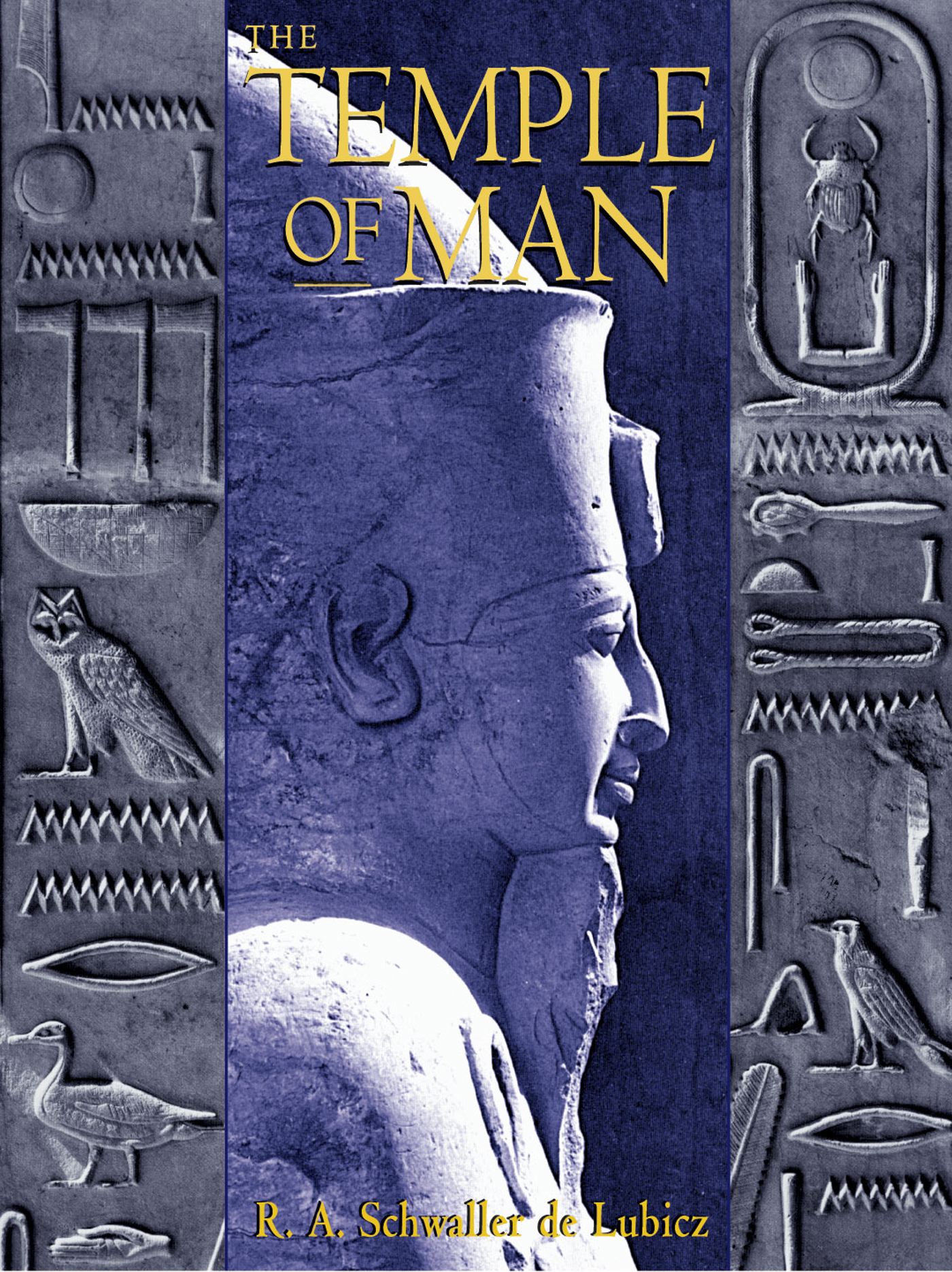 While in London from 1966 to 1973 West had studied under Gurdjieff teacher Sam Copley, who had himself been a student of Maurice Nicoll (1884-1953), a famous direct disciple of Gurdjieff. West left the Gurdjieff Foundation in 1973 but stated that it and its teachings made an indelible mark and remained with him as an influential factor for the rest of his life.(3) During this time West began his exploration of Egyptology. It was there that he discovered Schwaller de Lubicz, and began to read his monumental two volume work The Temple of Man. The book did not yet have an English translation, and West, knowing little French, had to read it in that language with a dictionary by his side. It took him two years to work through it, after which he was proficient in reading French. He then set himself the enormous task of decoding and transmitting Schwaller's ideas.
While in London from 1966 to 1973 West had studied under Gurdjieff teacher Sam Copley, who had himself been a student of Maurice Nicoll (1884-1953), a famous direct disciple of Gurdjieff. West left the Gurdjieff Foundation in 1973 but stated that it and its teachings made an indelible mark and remained with him as an influential factor for the rest of his life.(3) During this time West began his exploration of Egyptology. It was there that he discovered Schwaller de Lubicz, and began to read his monumental two volume work The Temple of Man. The book did not yet have an English translation, and West, knowing little French, had to read it in that language with a dictionary by his side. It took him two years to work through it, after which he was proficient in reading French. He then set himself the enormous task of decoding and transmitting Schwaller's ideas.
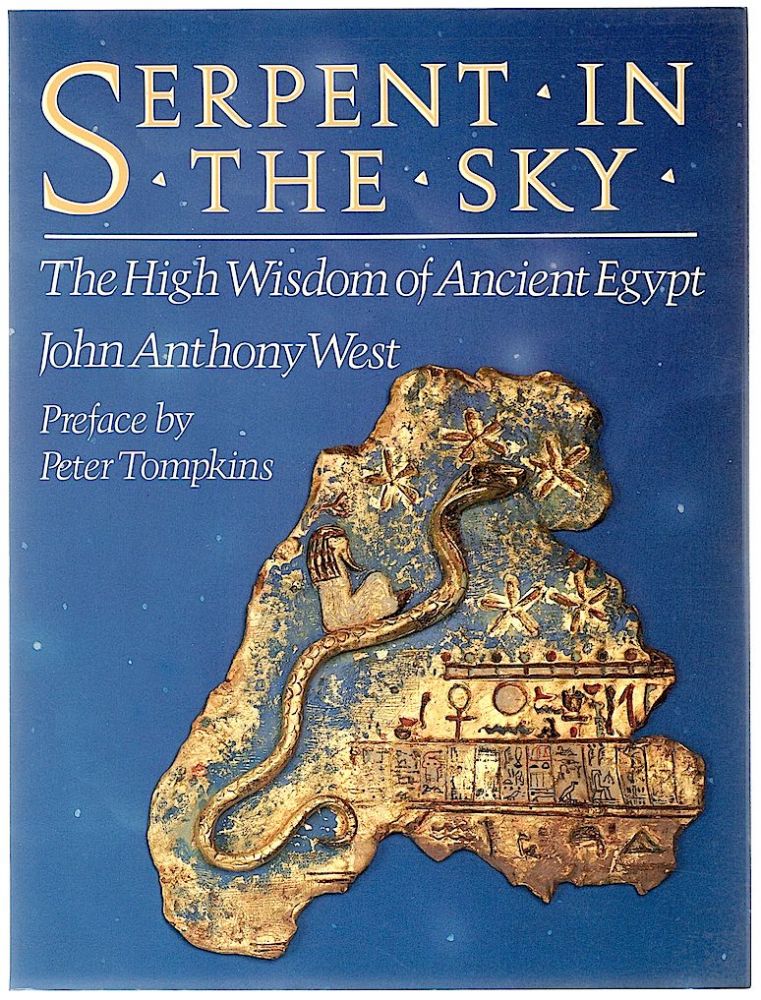 He eventually made his way back to America where he gradually settled in to the career that was to define him. The first part of his writing career—the science fiction and satire he wrote (mainly in Ibiza) and published had been something of a dress rehearsal for what was to follow. His first book for which he became widely known, Serpent in the Sky: The High Wisdom of Ancient Egypt, was published by Harper & Row in 1979 although it was the 2nd edition of this work, put out by Quest Books in 1993, that got his work more of the press it deserved. The work is West’s summary presentation of ancient Egypt understood largely via the symbolist teachings of Schwaller de Lubicz.
He eventually made his way back to America where he gradually settled in to the career that was to define him. The first part of his writing career—the science fiction and satire he wrote (mainly in Ibiza) and published had been something of a dress rehearsal for what was to follow. His first book for which he became widely known, Serpent in the Sky: The High Wisdom of Ancient Egypt, was published by Harper & Row in 1979 although it was the 2nd edition of this work, put out by Quest Books in 1993, that got his work more of the press it deserved. The work is West’s summary presentation of ancient Egypt understood largely via the symbolist teachings of Schwaller de Lubicz.
In 1985 John published The Traveler’s Key to Ancient Egypt, republished and distributed more widely by Quest Books in 1993. For a seeker of deeper truths West’s travel guide is generally recognized as the best, hands down, and this is even if one doesn’t subscribe to Schwaller de Lubicz’s symbolist theories of Egypt. It’s just an outstanding travel guide, almost 500 pages of intelligent writing in small font crammed with diagrams and photos, a true labor of love.
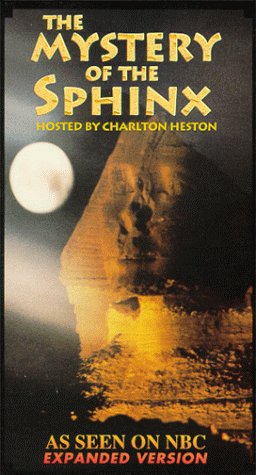 These books had been reissued in 1993 to capitalize (and rightly so) on the star power John’s works had been given via the 1993 NBC special called The Mystery of the Sphinx, narrated by none other than Moses himself, Charlton Heston. The documentary was seen by millions, and even led to John copping an Emmy award for Best Research. The BBC adapted it and retitled it Age of the Sphinx, airing it to much fanfare and another large audience. The slickly constructed documentary, mainly based on West’s and geologist Robert Schoch’s controversial re-dating of the age of the Sphinx, resulted in yet more heated controversy among and between academic historians and ‘alternative history’ followers that continues to this day. The documentary was very successful and widely seen.
These books had been reissued in 1993 to capitalize (and rightly so) on the star power John’s works had been given via the 1993 NBC special called The Mystery of the Sphinx, narrated by none other than Moses himself, Charlton Heston. The documentary was seen by millions, and even led to John copping an Emmy award for Best Research. The BBC adapted it and retitled it Age of the Sphinx, airing it to much fanfare and another large audience. The slickly constructed documentary, mainly based on West’s and geologist Robert Schoch’s controversial re-dating of the age of the Sphinx, resulted in yet more heated controversy among and between academic historians and ‘alternative history’ followers that continues to this day. The documentary was very successful and widely seen.
West was more than just an author, scholar, and a tour guide. He was also a kind of psychopomp, a guide to other worlds, Anubis in the body of an old white guy. He once stated that while Schwaller de Lubicz provided the intellectual substance of his Egypt tour teachings, it was Gurdjieff who was his ‘grey eminence’ (the more popular French term is éminence grise—it refers to a powerful behind-scenes influential force or figure).(4) This is a remarkable statement. Gurdjieff was a controversial man, probably the main avant-garde spiritual guru of the 1920-40s in Western Europe and America (he was based in France but made numerous trips to America to oversee his students there). Author of the almost impenetrable Beelzebub’s Tales to His Grandson (referenced by John in one of his emails to me), Gurdjieff was a one-of-a-kind master, as likely to offend as he was to inspire. John had done more than just read him; he’d also spent time in actual Gurdjieff inner-work groups. The significance of this point can't be emphasized enough, as 'armchair mystics' who never actually practice vastly outnumber bona fide practitioners.
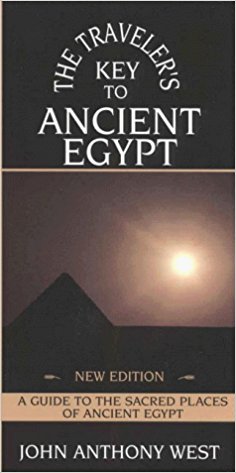 That’s a long way of saying that John was not just a guide to the outer monuments and art of ancient Egypt, he was also a guide to their inner worlds and teachings as well. Those who were unable to hear John in person via his tours, can still do it through DVD, where he and the teachings he represents and communicates so effectively can be heard and seen in the 2002 eight-volume Magical Egypt DVD series written and directed by West’s associate Chance Gardner (I’m thinking this name has to have been based on Peter Sellers’ immortal ‘Chauncey Gardner’ character from the fabulous satirical 1979 film Being There). Gardner (who is indeed a real filmmaker) has recently issued a ‘Part 2’ of this excellent documentary.
That’s a long way of saying that John was not just a guide to the outer monuments and art of ancient Egypt, he was also a guide to their inner worlds and teachings as well. Those who were unable to hear John in person via his tours, can still do it through DVD, where he and the teachings he represents and communicates so effectively can be heard and seen in the 2002 eight-volume Magical Egypt DVD series written and directed by West’s associate Chance Gardner (I’m thinking this name has to have been based on Peter Sellers’ immortal ‘Chauncey Gardner’ character from the fabulous satirical 1979 film Being There). Gardner (who is indeed a real filmmaker) has recently issued a ‘Part 2’ of this excellent documentary.
I’d mentioned above the geologist Robert Schoch who was such a key collaborator for West and one of his closest friends. Schoch wrote a moving tribute to John on his website a few days after his passing. In a footnote, he remarked,
There is no doubt in my mind that he was a genius. I have known many intelligent and highly educated people. JAW was one of the best informed and most intelligent individuals I have ever met. (5)
This coming from a Yale-educated academic is noteworthy, in part because it reinforces the notion that West was a connector for many people (myself included). I’ve often reflected on the lamentable gulf that exists between mainstream academia and the esoteric or ‘mystery traditions’. The latter has become partly unrecognizable in current times, watered down to westernized yoga teachings as ubiquitous as Starbucks or the province of too many new age airheads. The former (academia), too often suffers from a lack of experiential understanding of the great disciplines of transcendence, of the ‘sacred science’, or what Huxley called the ‘perennial philosophy’ and Wilber calls the ‘wisdom traditions’. West was a bona fide mystic who sounded like an erudite professor—albeit a brash one. This was a refreshing amalgamation of realms too often at odds with each other, or more commonly, barely aware of each other.
In one my last exchanges with John Anthony West I’d mentioned to him some brief correspondence I’d had with John Shirley, prolific novelist and screenwriter of The Crow (a cult 1994 horror film that starred Brandon Lee, son of Bruce. Brandon died tragically on the set due to a blunder with what was supposed to be a prop gun). Shirley had written a decent primer on the Gurdjieff Work (Gurdjieff: An Introduction to his Life and Ideas) but had declined to endorse my book because he detested Osho. Shirley, author of almost endless horror stories, including the memorably titled Really, Really, Really Weird Stories (as well as some good science fiction—he wrote the screenplay for a Star Trek: Deep Space Nine episode) had himself a decidedly dim view of the ‘dark side’. In an email exchange I had with him Shirley remarked,
As for Crowley, Gurdjieff despised him and I have mixed feelings about him. Mostly I think he was an intelligent, talented hustler. His Magick in Theory and Practice was a pretty smart book, if you take ritual magic seriously, which I don’t. I don’t believe in magic. Only science— sometimes science is hidden in the ‘esoteric’. I do think he had a pretty good handle on Asian spirituality. He wrote a good novel, Moonchild, and some tolerable Swinburnian poetry. But he was ultimately a left-hand-path person or else someone who thought he could straddle paths—and I believe in choosing sides. I believe in the right-hand path. I don’t like to encourage the other side.(6)
Shirley, like West and myself, had been in the Gurdjieff Work. On that Shirley remarked,
I’ve had twenty-some years in the Work and it wasn’t enough.(7)
A very common refrain. West was familiar with Shirley and commented on his book about Gurdjieff.
I have that book, started it, thought it interesting but never got around to reading further. Heard an intriguing interview with Shirley. Mentions Alfred Jarry, best thing I ever wrote (in my opinion) is a play based upon Jarry’s life (badly done both by BBC radio, 1967 or so and off-off Broadway in 1981). I like seeing such connections.(8)
West had written Jarry: A Spectacle while on Ibiza in the 1960s. The play was eventually performed in London and New York. Alfred Jarry (1873-1907) was a curious and fascinating character who died young, age 34. He was one of the original ‘satirist’ writers, utilizing dark humor as a way to comment on the absurd qualities of life and existence. ‘Absurdist’ literature often featured characters in seemingly meaningless or ridiculous predicaments in which it was left to the reader to evaluate or judge the characters. Examples of ‘absurdist’ writers were Dostoyevsky, Kurt Vonnegut, and perhaps the supreme example, Franz Kafka (especially his short story Metamorphosis, about a man who wakes up one morning to discover that overnight he has turned into a beetle). Parallels in visual art were the Dadaist and the Surrealists such as Salvador Dali.
When John wrote in his email ‘off-off Broadway’, that wasn’t a typo. ‘Off-off Broadway’ is the more avant-garde element of Broadway theatre, held in physically smaller theatres usually only seating 100 or less, but with great creative flexibility for original storytelling. (Broadway theatres hold over 500 seats; 'off-Broadway' theatres seat from 100 to 500). This combination of the avant-garde theatre, and the figure of Alfred Jarry—along with John’s admission that his script on Jarry was his ‘best piece of writing ever’—in some ways captured for me the spirit of West as well as anything. He was a champion of the misunderstood (or barely known) genius, and that trait followed him all the way to his years disseminating the information of the obscure genius Schwaller de Lubicz, his involvement with the work of the obscure mystic Gurdjieff, and even supporting the geologist Robert Schoch, who in addition to West took his share of academic scorn over the years as he resolutely defended and scientifically developed and elaborated on the ideas that Schwaller de Lubicz and West had presented in seed form.
Did John Anthony West ever lose touch with the satirist within him as he immersed himself in years and years of rewarding and frustrating work in alternative Egyptology? I don’t think so. That sharp, humorous take on life stayed with him throughout his five decade war with the ancient history academic establishment. In commenting on our consensus views of history and Gurdjieff’s idea of the ‘legominism’ (a teaching transmitted into the future via some fashion, often coded, serving some unseen purp0se), he once said,
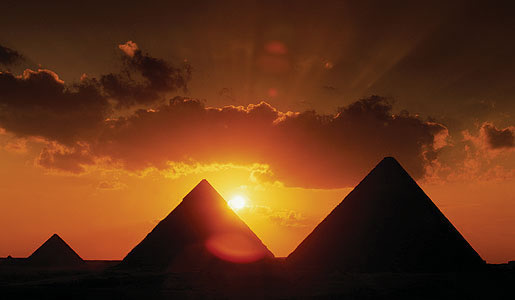 We’ve been indoctrinated with an absolutely false picture of history and it’s not so difficult to document in a very dramatic way. There's something that Gurdjieff had a word for, legominisms, referring to humanity having a collective residual memory. The whole myth of the Golden Age seems deeply rooted in society. Wherever you go, any place in the world, there is a tradition of a very advanced society in much earlier times. A time when human beings were not in the chaotic and distraught condition that they’re in at the moment. Nevertheless, by the Church of Progress we are taught that we’re the height of civilization, and here we are with our Disneyland and our Wal-Marts and our hydrogen bombs and our striped toothpaste and we’re the best there is. Primitives built the Temple of Luxor, religious zealots built the cathedral of Chartres etc., etc. This is what has to be confronted and that can be done through scholarship.(9)
We’ve been indoctrinated with an absolutely false picture of history and it’s not so difficult to document in a very dramatic way. There's something that Gurdjieff had a word for, legominisms, referring to humanity having a collective residual memory. The whole myth of the Golden Age seems deeply rooted in society. Wherever you go, any place in the world, there is a tradition of a very advanced society in much earlier times. A time when human beings were not in the chaotic and distraught condition that they’re in at the moment. Nevertheless, by the Church of Progress we are taught that we’re the height of civilization, and here we are with our Disneyland and our Wal-Marts and our hydrogen bombs and our striped toothpaste and we’re the best there is. Primitives built the Temple of Luxor, religious zealots built the cathedral of Chartres etc., etc. This is what has to be confronted and that can be done through scholarship.(9)
West was able to deconstruct some of the problems in conventional thinking with regards to the past, but he did it all in style, and with a ready-share of satirical humor alongside. ‘Striped toothpaste’? The passage is vintage West.
The argument against such visionaries such as Schwaller de Lubicz or John Anthony West is that they were ultimately romantics, projecting ideas and assuming scientific and spiritual grandness in ancient cultures that these ancients did not in fact possess. The standard academic view is that the ancient Egyptians lacked the wisdom attributed to them by romantic alternative historians. The alternative view is that the mainstream academic approach is severely limited by the dictums of its method and how decades of piled up research and assumptions make it very difficult to move the needle on any given point of view. There is probably some merit on both sides of the argument. But as a person West was hard to deny, owing to both force of character and breadth of wisdom--consistent with Gurdjieff's maxim to emphasize being over empty knowledge. Time will tell in regards to visionaries like West, as it always does.
John’s last remark to me back then—after I’d told him to expect a hard copy of The Three Dangerous Magi in the mail in about a year’s time—was also vintage West:
A year? And therein lies just one of the wonders of on-demand, self publishing, the Writer’s Emancipation Proclamation. To hell with publishers! (10)
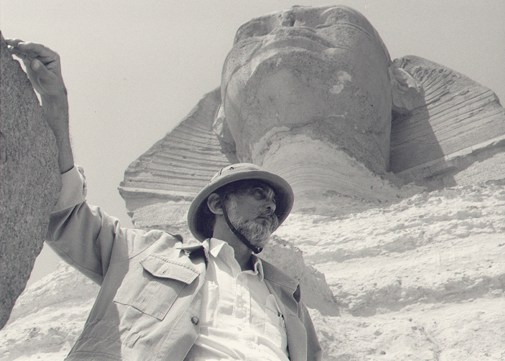
________________
Below is appended one of West’s classic and spirited responses (from way back in 1979) to a mainstream historian who responded negatively his book Serpent in the Sky. His nemesis, Peter Green, was no idiot, but an intelligent and well-informed Egyptologist who took serious issue with West’s interpretations. But hell, this is a blog on West and so here he gets the last (and only) word.
Tut-Tut-Tut from the October 11, 1979 issue
The New York Review of Books
The Secret of the Pyramids
John Anthony West in reply to Peter Green
To the Editors:
While partisanship may be unavoidable in any scholarly dispute, the distortion or neglect of carefully marshalled evidence is seldom becoming. Peter Green’s piece of party-line Egyptology [NYR, October 11] misrepresents and glosses over an important and valid controversy.
The psychological and/or commercial motivations for the Tut craze are of no more consequence than those for jogging or fashion-design jeans. But the state of knowledge (or lack of it) of Ancient Egypt can determine our conception of early civilizations, a matter with ramifications extending far beyond mere scholarly dispute.
Since Mr. Green lumps enthusiasts and Romantics in willy-nilly with the heretics (a ruse common to orthodoxies the world over) distinctions will have to be made. Divine intervention in the building of the Great Pyramid, encoded prophecies, and visiting spacemen are red herrings. Though the individual issues are complex, the controversy can be polarized in simple terms: Either the Egyptians knew what they were doing and why they were doing it, or they did not.
Orthodox Egyptology depicts the ancient. Egyptians as a race of spectacularly accomplished primitives. Slavishly devoted to an animistic, incoherent religion, devoid of real science, mathematics, or philosophy, these curious Egyptians—the most conservative race on earth—went on for four millennia producing artistic and architectural masterpieces unheard of before and unequaled since. (This implies, of course, that at some point the Egyptians must have been the most innovative race on earth to develop these techniques in the first place, but immediately thereafter, they became the most conservative.)
While this view has prevailed since Napoleon opened Egypt to the West, it has been challenged from the very beginning, and it has been challenged (a fact carefully omitted by Peter Green) by sound, sane scholars eminent within their fields, as well as by cranks and sensationalists. Astronomers have challenged the view of Egyptian astronomy. Mathematicians have challenged the view of mathematics. Philosophers and theologians have sought a rationale behind Egypt’s bewildering and apparently banal religious symbolism. By and large, all these heretics have been struck by the apparent paradox: How could a race so supremely accomplished in certain fields be so grotesquely deficient in others? In general, their inquiries indicate that the paradox is the creation of Egyptologists, not of the Egyptians (cf. Secrets of the Great Pyramid by Peter Tompkins for a solid account of the controversy regarding the pyramids).
Yet, despite the challenges, many questions remained, particularly regarding Egyptian religion, symbolism, and philosophy.
It is my belief that these have now been answered, and the paradox resolved incontrovertibly by the French mathematician and philosopher, the late R.A. Schwaller de Lubicz, whose fifteen years research at Luxor and whose massive documentation is the subject of my own book, Serpent in the Sky, summarily but predictably dismissed by Peter Green.
Struck by the strange asymmetries of the Temple of Luxor, de Lubicz initially set out to see if the sciences of harmony and proportion (supposedly Greek inventions) had been known to the architects of Luxor a thousand years earlier. In itself, this would have necessitated a drastic rewrite of accepted history.
Careful measurements soon corroborated this hunch, but the unexpected sophistication of Egyptian harmonic, geometrical, and proportional knowledge drove de Lubicz on to look for what lay behind it. In the end, he developed a kind of “unified field” theory of Egyptology, consistent within itself, backed in every instance by meticulous documentation, and verified, where relevant, by the architect in charge of excavations for the French archaeological institute, and by a fully qualified Egyptologist who had been won over to de Lubicz’s arguments.
De Lubicz was able to show that Egyptologists had not only vastly underrated the scientific, mathematical, and astronomical knowledge of ancient Egypt, but that they had totally failed to understand the religious philosophy that was its basis. In retrospect, it is clear that this was almost inevitable. If visiting Martians reported home with an account of a baseball game, and games were unknown to Mars, the results would be similar. Earthlings would be engaged in weird, ritualistic activities, devoid of meaning, incoherent, and yet all-absorbing.
De Lubicz has demonstrated the coherent, mystical philosophy underlying all of Egyptian civilization: he has explained baseball to the Martians. But as it turns out, our Martians—for reasons much more interesting than those responsible for the Tut craze—do not want to learn. They prefer to go on thinking of baseball as the mumbo-jumbo of the Earthlings.
Galileo, furnished with no less commanding evidence than de Lubicz, faced a similar situation and similar opponents in a recognizably similar context. Readers interested in knowing more about ancient civilization, and emotionally equipped to handle a view that happens not to be geocentric, would do well to look further than Peter Green.
John Anthony West
New York City
October, 1979
Notes
- Personal email, January 4, 2010
- Personal email, January 5, 2010
- http://www.gurdjieff-internet.com/article_details.php?ID=352&W=2, accessed February 12, 2018.
- YouTube interview, accessed February 9, 2018, https://www.youtube.com/watch?v=bpOuNQZpOUc at 14:55.
- http://www.robertschoch.com/john_anthony_west.html
- Personal email, December 21, 2009
- Personal email, December 21, 2009
- Personal email, January 6, 2010
- http://www.gurdjieff-internet.com/article_details.php?ID=352&W=2, accessed February 13, 2018.
- Personal email, January 6, 2010
Copyright 2018 by P.T. Mistlberger